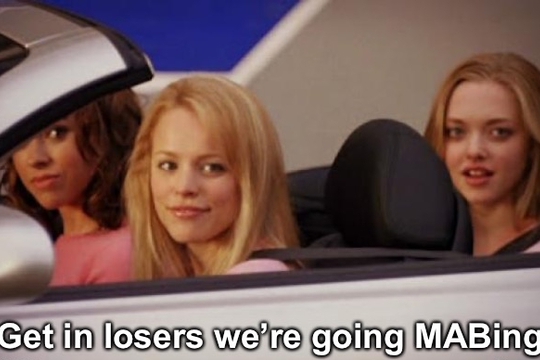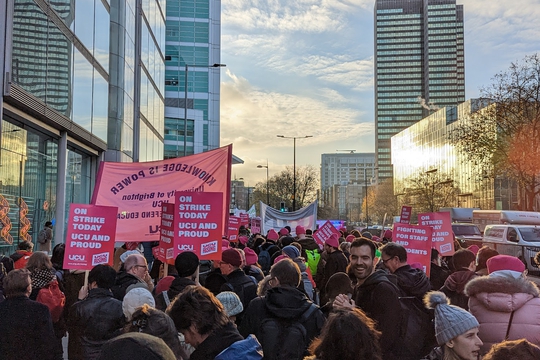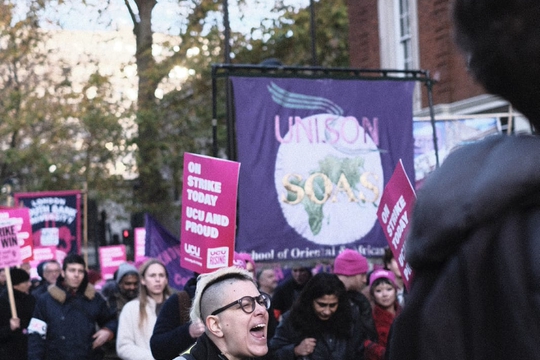Notes on a Marking and Assessment Boycott
by
Roberto Mozzachiodi,
Joe Newman
January 20, 2023
Reflections and lessons from marking and assessment boycotts at Goldsmith University

bulletins
Notes on a Marking and Assessment Boycott
by
Roberto Mozzachiodi,
Joe Newman
/
Jan. 20, 2023
Reflections and lessons from marking and assessment boycotts at Goldsmith University
It is highly likely that the current national UCU disputes will involve a summer marking and assessment boycott (MAB). We want to offer a reflection on our experiences of carrying out a MAB at our workplace, Goldsmiths College, University of London. The purpose of this reflection is to transmit our organisational knowledge and the lessons we’ve learned to branches across the sector who will be involved in this action.
Goldsmiths is a relatively small institution with around 9800 students and around 2600 staff. The university specialises in arts, humanities and social science degrees. The UCU branch is strong in numbers with around 1000 members but as with many trade union branches, most of the core activities are carried out by a small group of dedicated activists. The branch has an established executive committee, and any reps receiving paid ‘facilities time’ will fulfil a particular role or brief (president, secretary, equalities officer, anti-casualisation officer etc.) The branch also has a fairly developed departmental rep system, with most departments covered by at least one rep who will convene departmental union meetings on a semi-regular basis and feedback to the executive.
Branch officers generally meet on a weekly basis, branch meetings are held every two weeks, and local members’ emails are sent out every other week. During periods of industrial action, particularly our recent local disputes, communications might be sent out to members several times a week and branch meetings would take place weekly. Our branch meetings vary in numbers: as many as 200 in hot moments and 15 in the quietest periods. Online meetings over Zoom have allowed more members to engage in democratic decision-making within the branch, but has also led to a passivity in meetings that can make it more difficult to gauge members’ appetite for action.
From 2018 until now, Goldsmiths UCU (GUCU) has turned out massive results in all national UCU ballots and has run two local disputes involving sustained industrial action. Given these contextual details, it is unlikely that all aspects of our reflection and advice will be generalisable. However, given the extent of our practical experience of organising MABs and our awareness of how managers respond to this tactic, we hope that branches will find our insight useful when preparing for this action in their own contexts. These reflections are in no way intended to be a comprehensive assessment of recent local disputes at Goldsmiths, nor of the branch itself.
2021
GUCU first initiated a MAB on Tuesday 5 January 2021, as part of a local dispute over planned redundancies. Given the context of the pandemic, as well as the senior management team’s intention to begin sacking staff as early as the end of the spring term, GUCU pursued a MAB instead of local strike action. The practical steps involved in a MAB had already been plotted out in the summer of 2020, when casualised staff in 3 departments organised a wildcat action in defence of 472 hourly paid and fixed term contracts, which the college was allowing to lapse whilst refusing to furlough staff. The 2021 boycott that followed ended on Friday 30 April, almost four months later, with a guarantee of no compulsory redundancies until 28 February 2022 in addition to a number of other commitments: to protect staffing budgets for Associate Lecturers; greater transparency around Fixed Term Contracts due to expire; and Equalities Impact Assessments to be carried out should any redundancies be planned for the future.
Unsurprisingly, almost all of the commitments made by the senior management team (SMT) at the time have since been reneged on, including promises made around tackling casualisation - dubbed ‘the operationalisation of the assimilation agreement’, in new heights of meaningless management-speak. This slow death-by-committee is worth bearing in mind as we demand meaningful action from UCEA to close pay gaps and end casualisation, and is something that the inflated layer of management in Higher Education are skilled in, based on their response to ongoing efforts to challenge white supremacy and build an anti-racist campus within our institutions. We should anticipate that any formal commitments gained from our current industrial dispute will require extensive follow-up work before they see the light of day.
The 2021 MAB starting early on in the academic calendar had the advantage of covering all assessments submitted thus far, as work submitted before the Christmas break had a planned date for the return of marks and feedback that was covered by the boycott. This meant that our leverage increased significantly as the action went on. To monitor the progress and strength of the action and respond to different grading processes used in departments, we established weekly ‘action committee’ meetings with members. This allowed branch officers to be responsive to breaches in the action and strike busting by middle managers. We also produced an exhaustive set of guidelines for the action, along with an FAQ.
However, branch officers and activists found it harder to motivate members to participate in an action that might disrupt students’ progression and graduation when the shape and number of staff cuts remained unclear, despite GUCU negotiators’ warnings that the intended savings would result in tens of jobs being cut. Nonetheless, the majority of branch members felt that SMT’s offer could not be improved, and so voted to end the boycott. Some members had argued that the branch should continue to hold out for longer term protection against job cuts while the boycott was still underway, as the original demand in the ballot claim sought 2 years’ protection. The initiation of a fresh local dispute in 2022 coincided with the end of the brief period of protection won from the previous dispute, with management initiating redundancy processes as soon as they could in order to begin making staff redundant on 28 February 2022. The break between these actions severely diminished the momentum and organisational integrity within the branch.
It is also important to point out that one of the arguments that persuaded most members to resolve the action was the risks that the MAB might pose to international students and their visa requirements. It is therefore crucial that branches establish UKVI requirements for international students early on, in order to address these arguments. It is also important from the outset that members are cognisant of the real possibility of students not graduating, should UCEA and UUK remain willfully intransigent; when members are not prepared for the possible disruptions caused by industrial actions, they are more likely to opt out once the impact becomes real.
2022
GUCU initiated a local dispute once again, only 5 months later, when management served both recognised campus trade unions with Section 188 notices outlining up to 52 redundancies. This involved cutting back and centralising vital administrative labour, in addition to targeting two academic departments on the basis of their low ‘contribution rate’: the amount of income each department was expected to pass back to the college, initially set at 45%.
Following a total of 37 strike days across two terms - mostly local, but with the addition of some national action - GUCU initiated a MAB on Monday 4 April 2022, and the boycott was sustained for nearly 4 months. During this time, we recommended that members should not state that they were ‘withholding marks and feedback’, as we were advised that marks - once generated - would be the intellectual property of the college. Instead, members asserted that no marking would take place until the boycott was called off, which ensured that management needed to factor in an additional three weeks of marking beyond any resolution of the dispute and an agreed return to work, before marks could be processed. The restructuring and centralisation of administration that SMT were able to push through before the end of the dispute resulted in widespread errors and delays in processing marks, which were still being resolved long after the boycott had finished. This, alongside an extensively delayed and poorly administered strike compensation scheme, massively disrupted students’ studies well into the current academic year.
During the MAB, students were still able to submit their assessed work as normal, and for practical assessments such as performances and degree shows, GUCU members attended but only to make notes; here, we argued that attending a performance or visiting a degree show was in no way representative or indicative of the kind of labour involved in generating marks or producing written feedback. In cases where exam papers had not yet been generated, we asked members not to devise these questions.
There were a number of challenges that the branch faced during the period of the boycott. Firstly, management were prepared to lie to the governing bodies of the college about the impact of the boycott. Prior to the pandemic, an aborted attempt at restructuring (dubbed ‘Evolving Goldsmiths’) had led to the creation of new senior management positions. These new Heads of School were appointed only on an interim basis, and so the potential precarity of their posts was used as a way to ensure that new members of the management team toed the Warden’s line; when the boycott’s potential impacts on progression and graduation were raised, it was the Heads of Schools’ job to disavow any concern and reassure un-elected Council members that there would be no disruption.
To keep up the lie, SMT were even prepared to take immediate and punitive action against any staff that dared to communicate transparently with students about the boycott. In Goldsmiths’ largest department, this involved the college suspending two members of department management simply for sending an email to students, a decision that was then overturned in late October when an independent investigation determined that there was ‘no case to answer’. It was only when our MAB was covered by BBC London News that senior management acknowledged that graduations might not be able to go ahead. It was at this point, when the impact of the action had attracted high-profile media attention and SMT’s lies were exposed, that the balance of power in negotiations started to shift.
It is worth stressing that after 37 days of strike action, we were only able to delay the redundancy process. Until the MAB began to bite, our employers had offered no tangible concessions in negotiations. Therefore, we should expect UCEA and UUK board members to lie about the effectiveness of a national MAB, in their efforts to demoralise UCU members and break our action. For this reason, it is essential that the national union commits resources to effectively monitoring the strength of the action, in order to counter the employer’s propaganda.
Secondly, in order to sustain a MAB across a period of months, it is vital that branches build capacity and organise within departments and across the institution - particularly amongst precariously employed staff. Being able to gather information around the extent of the impact that the action is having, based on how many members are participating, is invaluable to motivating a branch. This kind of data was collected and presented to GUCU members towards the end of our action, but by this time many members had already decided to submit their marks; although there were committed activists across the institution who were still holding out, by late June only two departments had been able to organise significant participation in the boycott. With sustained strike action, there is the possibility that branch membership and member participation can increase, but with a MAB, leverage is lost as soon as members begin to hand in their marks - a decision that cannot be reversed.
Marking and assessment boycotts can also feel like an oddly individualised form of resistance; as the impact of a MAB is effectively invisible to members until graduations are imminent, it is very easy for members to feel that they are having little to no impact. Therefore, alongside evidencing the impact of the action through data gathering, setting up collective ways of checking in, communicating with and organising members on a week-by-week basis is absolutely vital - both at branch and department level, such as regular branch-wide surgeries to respond to practical queries.
Lastly, to try and undermine the boycott, Goldsmiths’ SMT introduced exceptional academic regulations (EARs) that would enable them to progress students with marks from only 50% of their credit-bearing modules, in addition to graduating students with more than 50% of final year marks on a provisional basis, doing away with the need for subject-level external examiners or any internal moderation of assessments, and producing an overall mark for a module where 50% or more of the assessments had been marked. Given that the timing of the MAB meant that marks from autumn term assessments had already been submitted, this resulted in only the two aforementioned departments posing specific challenges for management, in terms of circumventing any and all notions of academic integrity.
However, these EARs had been drafted on management’s assumption that UKVI would accept provisional grades when international students applied for Postgraduate Study visas, or Post-Study Work visas. In fact, they didn’t even bother to check. It was only after branch officers contacted UKVI directly that it became clear that management’s attempts to ignore and then undermine the boycott were jeopardising the immigration status of international students. We cannot expect the boards of UCEA and UUK to approach this any differently, and the potential impacts of the MAB on international students - within the context of a hostile environment in HE - must be considered by all branches.
Any reflection on Goldsmiths’ local dispute during the 2021/22 academic year must also acknowledge that 17 members of staff were made redundant. A branch that states that one redundancy is one too many must also be able to acknowledge the ways in which it failed to defend all of its members. If any gains were made as a result of our local dispute, it was in large part due to the tireless efforts of those members who were forced to endure the redundancy processes, including staff who were teaching on programmes that for much of the dispute remained at risk of closure, such as the MAs in Queer History, Black British History and Black British Literature.
The staff ultimately targeted for redundancy were primarily women trade union activists working on part time contracts, with teaching focused on decolonial and migrant perspectives, the history of the modern Middle East, and Foundation Year courses that sought to remove barriers to Higher Education for students from a range of educational backgrounds. That 17 of these colleagues lost their jobs requires all GUCU members to reflect on what we really mean when we talk of ‘solidarity’.
Goldsmiths UCU’s second marking and assessment boycott came to an end on Friday 29 July, with a commitment to no further redundancies as part of management’s restructuring and cost-saving efforts - referred to as the ‘Recovery Programme’. Ultimately, given the low participation in the boycott towards the end of the action, it’s likely that beyond the imminent impact on graduations, only two factors shifted management’s position: our successful reballot in April that would have allowed us to sustain industrial action for a further 6 months, and the threat of strike action at the start of the following academic year.
Similarly, in our current national disputes, we cannot regard a MAB as a silver bullet - in and of itself, it will not be enough to win sweeping concessions from our employer. However, if we begin organising now and building networks of activists within and across departments, as well as in teams of professional services/academic-related staff, our union has the best possible chance of holding a line and asserting our collective power early on in the boycott. While the 18 days of national strike action between February and March will no doubt influence negotiations, all branches should be using picket lines to organise and plan for a summer MAB.
It is unlikely that the employer will be able to organise exceptional academic regulations at a national level without drawing attention from the Office for Students, but they will try. At the same time, we must prepare ourselves for more punitive pay deductions, as comrades at Queen Mary have experienced, as well as building solidarity with students by highlighting the exploitative nature of the student loan system, with repayment thresholds and interest rates that disproportionately impact lower earning graduates. Beyond an end to casualisation, unsafe workloads and unconscionable pay gaps, we must also begin to put forward an alternative vision of Higher Education - one that isn’t speculatively built on borrowing and debt, but is publicly funded for the benefit of all.
Subscribe to Notes from Below
Subscribe now to Notes from Below, and get our print issues sent to your front door three times a year. For every subscriber, we’re also able to print a load of free copies to hand out in workplaces, neighbourhoods, prisons and picket lines. Can you subscribe now and support us in spreading Marxist ideas in the workplace?
Read next

How to Stop a University
by
Zara Dinnen,
James Eastwood
/
Dec. 18, 2022

